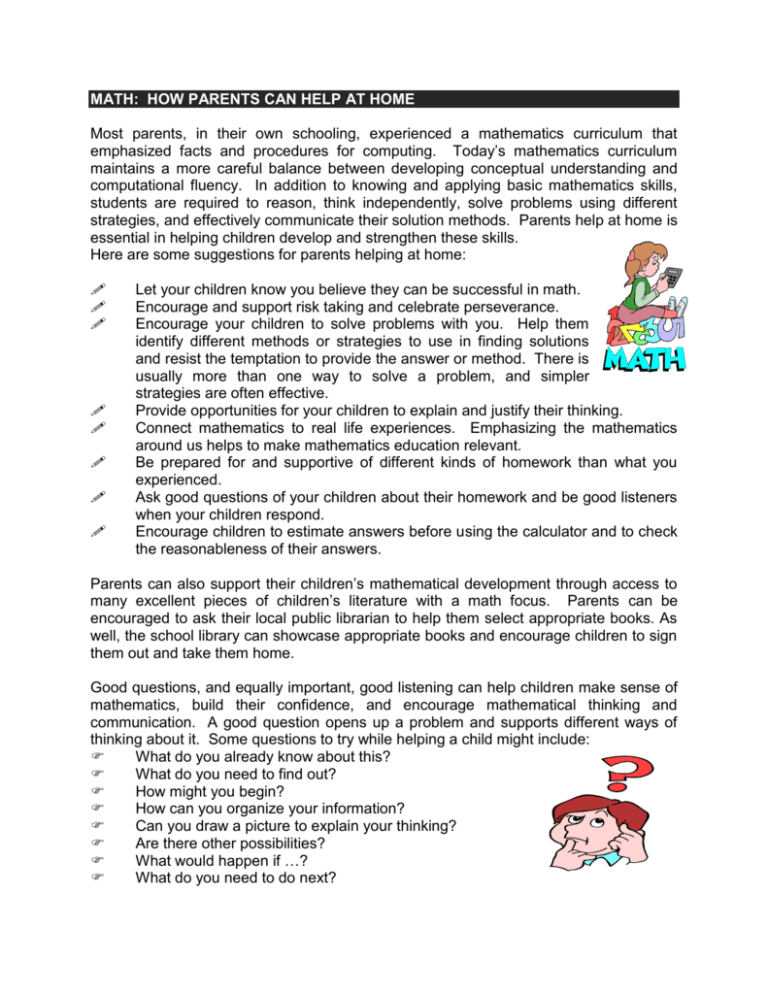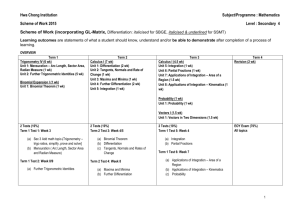math: how parents can help at home
advertisement

MATH: HOW PARENTS CAN HELP AT HOME Most parents, in their own schooling, experienced a mathematics curriculum that emphasized facts and procedures for computing. Today’s mathematics curriculum maintains a more careful balance between developing conceptual understanding and computational fluency. In addition to knowing and applying basic mathematics skills, students are required to reason, think independently, solve problems using different strategies, and effectively communicate their solution methods. Parents help at home is essential in helping children develop and strengthen these skills. Here are some suggestions for parents helping at home: Let your children know you believe they can be successful in math. Encourage and support risk taking and celebrate perseverance. Encourage your children to solve problems with you. Help them identify different methods or strategies to use in finding solutions and resist the temptation to provide the answer or method. There is usually more than one way to solve a problem, and simpler strategies are often effective. Provide opportunities for your children to explain and justify their thinking. Connect mathematics to real life experiences. Emphasizing the mathematics around us helps to make mathematics education relevant. Be prepared for and supportive of different kinds of homework than what you experienced. Ask good questions of your children about their homework and be good listeners when your children respond. Encourage children to estimate answers before using the calculator and to check the reasonableness of their answers. Parents can also support their children’s mathematical development through access to many excellent pieces of children’s literature with a math focus. Parents can be encouraged to ask their local public librarian to help them select appropriate books. As well, the school library can showcase appropriate books and encourage children to sign them out and take them home. Good questions, and equally important, good listening can help children make sense of mathematics, build their confidence, and encourage mathematical thinking and communication. A good question opens up a problem and supports different ways of thinking about it. Some questions to try while helping a child might include: What do you already know about this? What do you need to find out? How might you begin? How can you organize your information? Can you draw a picture to explain your thinking? Are there other possibilities? What would happen if …? What do you need to do next? Can you describe the approach or strategy you are using to solve this? Do you see any patterns? Is your solution reasonable? Does it make sense? How did you arrive at your answer? Can you convince me that your solution makes sense? What did you try that didn’t work? Parents should avoid stopping as soon as they hear the ‘right’ answer. Carefully worded responses, such as the following, give children a chance to clarify and extend their thinking: What do you think of that? Tell me more. Can you explain it a different way? Is there another possibility? READING: THE FAMILY THING TO DO How you help children read books depends on their stage of development in reading. As children become better readers the help they need changes. It is important for children to know that what is being read has to make sense. When children have difficulty with words: Wait a few seconds and allow the child time to think Encourage looking at the picture for clues Talk about what makes sense Suggest skipping the word and reading on to the end of the sentence to look for other clues Suggest going back to the beginning of the sentence and re-reading Ask the child to sound out the word. Families can help children understand the meaning of what is being read by: Talking about the book before beginning to read Using the pictures to help make sense of what has happened before continuing Reading short sections and talking about what has happened before going on Asking questions, guessing what will happen next, and reading to see if the guess was right Going back and re-reading if things become confused. If the book seems too difficult, families can: Read the book aloud and let the child read any parts that are easy Read a short section aloud and then have the child read it Have the child read pages a number of times until the reading is smooth Ask your child’s teacher for suggestions.






